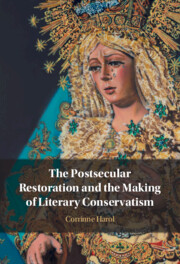
- Publisher:
- Cambridge University Press
- Online publication date:
- June 2023
- Print publication year:
- 2022
- Online ISBN:
- 9781009273497
- Subjects:
- Literature, English Literature 1700-1830


This book reveals a synergy between postsecularity – as a critique of emergent liberal secular ideals and practices – and the modern literary sphere, in which conservative writers feature prominently. Corrinne Harol argues boldly yet compellingly that influential literary forms and practices including fiction, mental freedom, worlding, reading, narration, and historical fiction are in fact derived from these writers' responses to secularization. Interrogating a series of concepts – faith, indulgence, figuring, reading, passivity, revolution, and nostalgia – central to secular culture, this study also engages with works by Aphra Behn, John Dryden, Margaret Cavendish and Walter Scott, as well as attending to the philosophies of Thomas Hobbes, David Hume, and Edmund Burke. Countering eighteenth-century studies' current overreliance on the secularization narrative (as content and method, fact and norm), this book models how a postsecular approach can help us to understand this period, and secularization itself, more fully.
‘Literary critics find it all too easy to equate formal innovation with a radical cast of mind. Corrinne Harol’s provocative new study proposes that the very idea of literary form sprang up from underappreciated conservative roots. Harol traces the postsecular all the way back to the seventeenth-century development of secular liberalism, seeing the two modes as entangled from the outset. Whereas emerging secular thought prioritized abstract theory and aspired to universality, postsecular critique stressed local material practice. The result deftly gathered in this book's pages is a version of modern conservatism that not only arrives earlier than expected, fully a century before Edmund Burke’s reaction to the French Revolution. It’s also a conservatism that’s decisively literary, marked (in the work of such counter-revolutionary innovators as Aphra Behn, John Dryden, and Margaret Cavendish) by a propensity to reshape given reality rather than to reinvent reality from scratch. This new strand of postsecular experimentation found its place outside of straightforwardly political and religious domains. The making of literary conservatism was to a surprising extent, Harol persuasively argues, the making of literature itself.’
Dustin D. Stewart - Columbia University
 Loading metrics...
Loading metrics...
* Views captured on Cambridge Core between #date#. This data will be updated every 24 hours.
Usage data cannot currently be displayed.